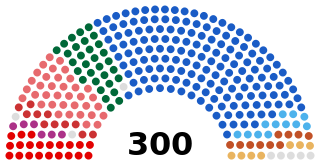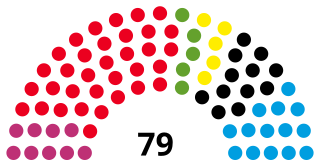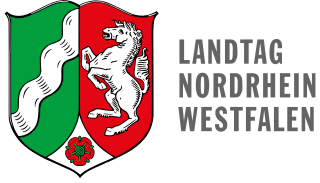
The Bundestag is the German federal parliament. It is the only federal representative body that is directly elected by the German people, comparable to the House of Commons of the United Kingdom. The Bundestag was established by Title III of the Basic Law for the Federal Republic of Germany in 1949 as one of the legislative bodies of Germany and thus it is the historical successor to the earlier Reichstag.

Liechtenstein is a principality governed under a semi-constitutional monarchy. It has a form of mixed constitution in which political power is shared by the monarch and a democratically elected parliament. There is a two-party system and a form of representative democracy in which the prime minister and head of government is responsible to parliament. However the Prince of Liechtenstein is head of state and exercises considerable political powers.

The German Bundesrat is a legislative body that represents the sixteen Länder of Germany at the federal level. The Bundesrat meets at the former Prussian House of Lords in Berlin. Its second seat is located in the former West German capital of Bonn.

A Landtag is generally the legislative assembly or parliament of a federated state or other subnational self-governing entity in German-speaking nations. It is usually a unicameral assembly exercising legislative competence in non-federal matters.

The Landtag of Saxony, also known in English as the Saxon State Parliament, is the legislature of the Free State of Saxony, one of Germany's sixteen states. It is responsible for legislation, control of the government, and electing some state officials. The Landtag has existed in various forms since 1831, but the current body was established during German reunification in 1990. The Landtag is directly elected and has a term of five years.

The Parliament of the Hellenes, commonly known as the Hellenic Parliament, is the unicameral legislature of Greece, located in the Old Royal Palace, overlooking Syntagma Square in Athens. The parliament is the supreme democratic institution that represents the citizens through an elected body of Members of Parliament (MPs).
The politics of North Rhine-Westphalia takes place within a framework of a federal parliamentary representative democratic republic. The two main parties are the Centre-right Christian Democratic Union and the Centre-left Social Democratic Party of Germany (SPD).

The Landtag of Mecklenburg-Vorpommern is the people's representative body or the state parliament of the German federal state of Mecklenburg-Vorpommern.

The Landtag of Hesse is the unicameral parliament of the State of Hesse in the Federal Republic of Germany. It convenes in the Stadtschloss in Wiesbaden. As a legislature it is responsible for passing laws at the state level and enacting the budget. Its most important function is to elect and control the state government. The constitution of the State of Hesse describes the role of the Landtag in sections 75 to 99.

The Landtag of North Rhine-Westphalia is the state parliament (Landtag) of the German federal state of North Rhine-Westphalia, which convenes in the state capital of Düsseldorf, in the eastern part of the district of Hafen. The parliament is the central legislative body in the political system of North Rhine-Westphalia. In addition to passing of laws, its most important tasks are the election of the Minister-President of the state and the administration of the government. The current government is a coalition of the CDU and the Greens, supporting the cabinet of Minister-President Hendrik Wüst since June 2022.

The Reichstag of the Weimar Republic (1919–1933) was the lower house of Germany's parliament; the upper house was the Reichsrat, which represented the states. The Reichstag convened for the first time on 24 June 1920, taking over from the Weimar National Assembly, which had served as an interim parliament following the collapse of the German Empire in November 1918.

The Prussian State Council was the second chamber of the bicameral legislature of the Free State of Prussia between 1921 and 1933; the first chamber was the Prussian Landtag. The members of the State Council were elected by the provincial parliaments and gave the provinces of Prussia a voice in the legislative process. The Council had an indirect right to introduce legislation, could object to bills passed by the Reichstag and had to approve expenditures that exceeded the budget.

As Vienna, the capital of Austria is both a city and a state, the 100 members of the Municipal Council (Gemeinderat) of the city of Vienna also act as members of the Landtag of the state of Vienna. Members serve for five years.

The 2018 Bavarian state election took place on 14 October 2018 to elect the 180 members of the 18th Landtag of Bavaria. The outgoing government was a majority of the Christian Social Union in Bavaria (CSU), led by Minister President Markus Söder.
The Minister-president is the head of state and government in thirteen of Germany's sixteen states.

The 2019 Brandenburg state election was held on 1 September 2019 to elect the members of the 7th Landtag of Brandenburg. It took place on the same day as the 2019 Saxony state election. The outgoing government was a coalition of the Social Democratic Party (SPD) and The Left, led by Minister-President Dietmar Woidke.

The next election to the Landtag of Thuringia is scheduled for 1 September 2024.

The 2022 Lower Saxony state election was held on 9 October 2022 to elect the 19th Landtag of Lower Saxony. The incumbent government was a coalition of the Social Democratic Party of Germany (SPD) and Christian Democratic Union of Germany (CDU) led by Minister-President Stephan Weil.

The 2023 Hessian state elections was held on Sunday October 8, to elect the 21st Landtag of Hesse. The outgoing government was a coalition of the Christian Democratic Union and The Greens, led by Minister-President Boris Rhein of the CDU. The 2023 Bavarian state election was held the same day.

The 1950 North Rhine-Westphalia state election was held on 18 June 1950 to elect the 2nd Landtag of North Rhine-Westphalia. The outgoing government was a coalition of the Christian Democratic Union (CDU), Social Democratic Party (SPD), and Centre Party led by Minister-President Karl Arnold.






















